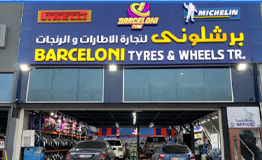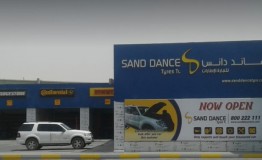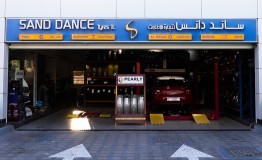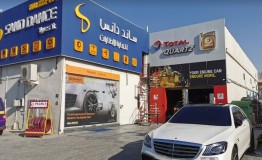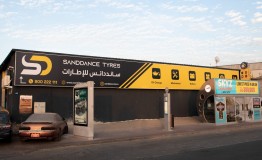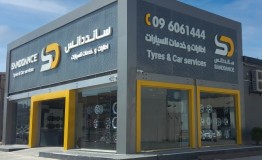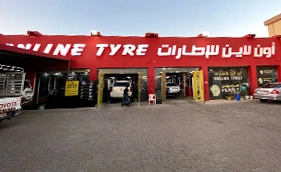Wide Tyres Benefits – Are Wide Tyres Always Better? The Truth About Width and Grip
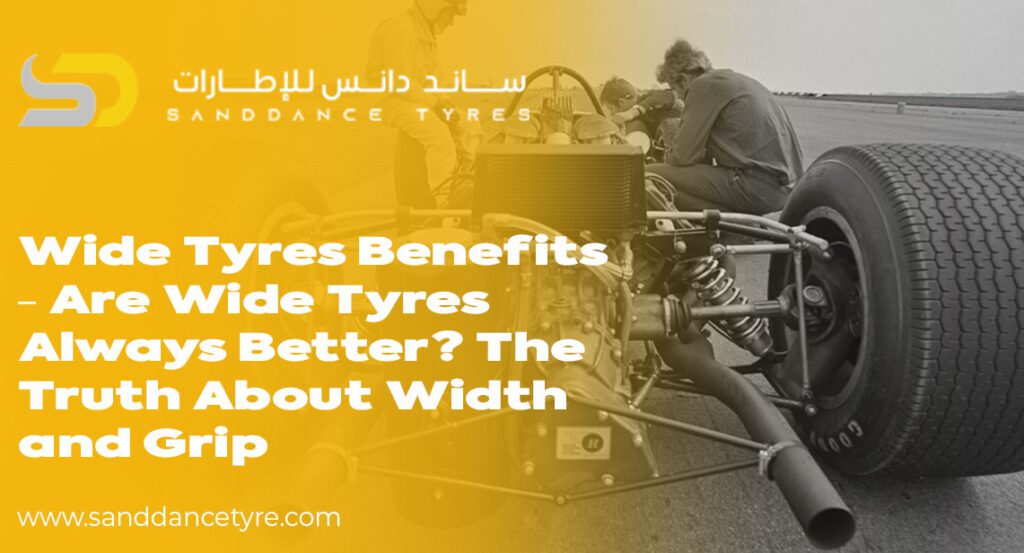
In the world of car mods and performance tweaks, what is most talked about among car fans is the use of wide tyres. Some think they are the best for performance on the road, while others note the trade-off issues that go along with them. Do wide tires outperform in all aspects? In this blog, we will get into the true wide tyres benefits as well as how tire width plays a role in your car’s grip, handling, and efficiency. Understanding Wide Tyres Benefits for Road Grip and Performance One of the top wide tyres benefits is increased surface contact with the road, which we call the tire contact patch. We see that a larger contact patch also means better grip in dry and wet conditions, which in turn makes your drive a more stable and secure one. At high speeds while negotiating sharp turns, wide tires improve your car’s performance and its ability to stay controlled and not slip or lose traction. Wider tyres are for sure a plus in dry weather performance. The wider the tire, the more friction it produces against the road surface. This said, on dry tarmac, cars that fit wider tires usually do better in brake performance and acceleration. In sports and performance cars, wide tires are almost a given for this very reason. Read More: Tyre Pressure Monitoring UAE—Should You Invest? How Wide Tyres Impact Tyre Contact Patch and Handling? The tyre contact patch is of great importance in how your car handles in different driving situations. Wide tyres have a broad, short contact patch. This which in turn, does a great job at spreading out the car’s weight more evenly; in effect, what we see is better handling in turns and improved stability at high speeds. However, we see that the handling improvement is a variable that is present depending on what you are doing. In city traffic or on light highway use, you may not see much of a difference. But in the case of sharp turns, off-road performance, or during emergency maneuvers, the better handling stands out. Also, it is reported that in performance models, drivers have more confidence and control in their cars when they are equipped with wider tyres. Rain Grip and Tyre Resistance – The Downsides of Going Wide While for sure, wide tires have their advantages, they also have tradeoffs in terms of wet weather performance, which we call rain grip, which is a very key issue. Wide tires may have trouble in standing water if they don’t have the right tread design. That which is also a large issue is hydroplaning in deep puddles or during heavy rain. Also, wide tyres see to it that we get more rolling resistance. This resistance, in turn, affects fuel economy. In city driving, which includes lots of start and stop action, vehicles with wide tires may use more fuel. Also, the extra weight of wide tyres puts more stress on the suspension and steering systems. Are Wide Tyres Always the Right Choice? Choosing different tire widths based on what you use your car for. If you drive a performance-oriented car that includes lots of twisty roads at high speeds, or you are a frequent motorway highway speedster, wide tires can greatly improve the performance and fun factor of your drive. They will also enhance dry grip, which in turn improves handling, which you will notice right away. For daily use, which includes mainly commuting in the city or to areas that see a lot of rain that which comes at the expense of performance, is often what you’ll trade in. In such which is cases, we recommend going for the moderate width or factory tread size, which still puts out great performance. At Sand Dance Tyre, we tailor our advice to each of our customers’ unique driving requirements, vehicle type, and road conditions. We don’t just go for the largest tire option out there; what we do is find the best fit for your safety, performance, and budget. Final Verdict on Wide Tyres Benefits Wide tires do indeed have great benefits in terms of performance and control, as well as look. They do transform the way your car drives and handles, and improve grip on the road. At the same time, it is important to look at the cons, which include tire contact patch, fuel efficiency in city traffic, performance in the rain, and wear-out rate. Making an informed decision will greatly affect how your car performs in the long term. For those who want wide tires for better performance or are seeking what tire is best for your lifestyle, we at Sand Dance Tyre have what you’re looking for. We have expert advice, great tire selection, and professional installation of the best products for your car. FAQs Q1: Do broad tyres reduce fuel efficiency? Yes, wider tires do increase rolling resistance, which in turn at times reduces the fuel efficiency of narrower tires. Q2: Do wide tires perform better in all weather? Not at all times. In dry weather, they do well, but in wet weather, they may not perform at their best unless they are designed for it. Q3: May I put wide tires on any car? Based on your vehicle’s specs, we see that it is up to you what you put on it, but we do advise against putting on very wide tires, which may not have enough clearance or which are not compatible with your wheel. This, in turn, may affect your suspension and steering. Q4: Do wide tires improve cornering? Sure, wider tires present a greater contact area, which in turn improves grip in corners and at high speed.
Tyre Pressure Monitoring UAE—Should You Invest?
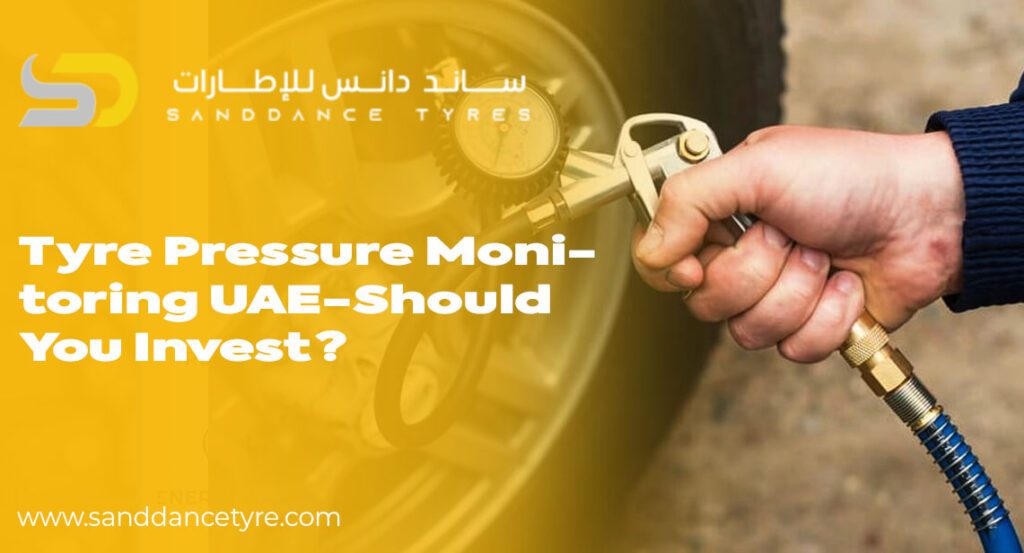
In the UAE, what it takes to be a good driver goes beyond a smooth-running engine and a full tank; it is also about optimal tyre performance at all times. What is often ignored is that which is a very important aspect of vehicle safety, tyre pressure. That is what Tyre Pressure Monitoring Systems (TPMS) are for. As for the question of whether you should get them or not, the answer is in what they do, what benefits they bring, and how they work, in particular, in our harsh desert climate and on the fast-paced highways of the Emirates. Understanding Tyre Pressure Monitoring UAE and Its Importance Tyre pressure monitoring UAE is reported by what we see as very advanced electronics, which, in real time, measure tyre pressure in your vehicle and alert you to anything out of the ordinary. What we are seeing is an increase in the presence of these systems in today’s cars, and that is because they serve as the first layer of protection against tyre-related accidents. In the United Arab Emirates, we see road temperatures at very high levels and also a great deal of long-distance travel, which in turn puts our cars’ tires at risk of being under-inflated. They wear out more quickly, and you also see a drop in fuel efficiency and an increase in the chance of issues with brakes. Thus, what we have is a tire pressure monitoring system, which is no longer a nice-to-have feature but a very much needed safety element, which brings peace of mind to every trip. Read More: Tyre Lifecycle: From Production to Recycling with Sand Dance Tyre How TPMS Fitment Enhances Vehicle Performance In the process of TPMS, we put in tire sensors that talk to your car’s computer system. These sensors report in real time on pressure changes, which may be from a slow leak, puncture, or a sudden drop in temperature. Installing TPMS in your car will see an improvement in the handling, which is very much the case when you are on the highways or in off-road terrains, which we have in the UAE. What you get is a safety and efficiency upgrade to your car’s performance. When your tires are at the right pressure all the time, your car runs smoother, it handles curves better, and it also performs better with fuel economy. Tyre Sensor Addition and Its Long-Term Benefits Adding tyre sensors at first may seem like a minor change, but in the long term, it is very beneficial. Tyre sensors will see you with fewer premature tyre wear issues, which in turn reduces your maintenance costs. Also, drivers report fewer blowouts and unexpected flats, which are not only very dangerous but also very annoying, at when you are on a long trip in a remote area. For the residents of Dubai, Abu Dhabi, Sharjah, or any other part of the UAE, we at TPMS can determine which of your tires are performing at an optimal level during the hottest summer days. We have sensors that are constant in their report and will alert you when there is an issue, thus you no longer have to play it by ear or go to the gas station for a manual check. Why TPMS is a Must-Have Safety Device in the UAE In the UAE, which has a desert climate, high speed limits, and the issues of sandstorms at short notice, we see investment in a safety device like a TPMS as not only smart but also a requirement. Also, proper tyre inflation issues out that the chance of tyre failure, which in turn makes your ride more stable, and also we see that proper tire inflation can go a long way in reducing CO2 emissions. Also, in that regard, if you are the owner of a luxury car or an SUV, which is a very common affair in the region, we see that having a TPMS adds to the car’s resale value. Also, it is noted that buyers do go for vehicles that are fitted with the latest safety features, which in turn play to your benefit in many ways. Is Tyre Pressure Monitoring UAE Worth the Investment? In the case of Tyre Pressure Monitoring UAE, it is clear they offer much more than just real-time alerts; they also improve your family’s safety, protect your vehicle’s tires, and in the long term save you money. Also, whether it’s a factory-included TPMS or an aftermarket installation, which you put in, getting one is a forward-thinking step for any driver in the UAE. The introduction of tire sensors improves your control of your car’s performance, which is true whether you are driving on Sheikh Zayed Road or through desert trails. In terms of tough weather conditions and the issue of tire health, TPMS is not a choice; it is a requirement for responsible drivers. For experts in the field, at Sand Dance Tyre, we have what it takes for your TPMS installation, and for checking that your vehicle is equipped with a compatible system. In the UAE, we have a team of technicians at your service that will help you out with all of your vehicles’ needs. We also present to you customized recommendations for the best fit to your specific driving needs. Improve your safety now with our in-depth TPMS solutions that are tailored just for the UAE’s weather and roads. Frequently Asked Questions 1. In what way does TPMS perform in the UAE climate? TPMS sensors are built for the extreme heat and wide temperature variation we see in the UAE. In our weather, they give early warning of when the tyre pressure drops due to heat or punctures. 2. Which types of vehicles can I put the TPMS on? Yes, in most cases, TPMS can be installed into present vehicles that are not equipped with them, which includes external and internal sensors, as per what is suitable. 3. Is it compulsory to have TPMS in the UAE? In many
Tyre Lifecycle: From Production to Recycling with Sand Dance Tyre
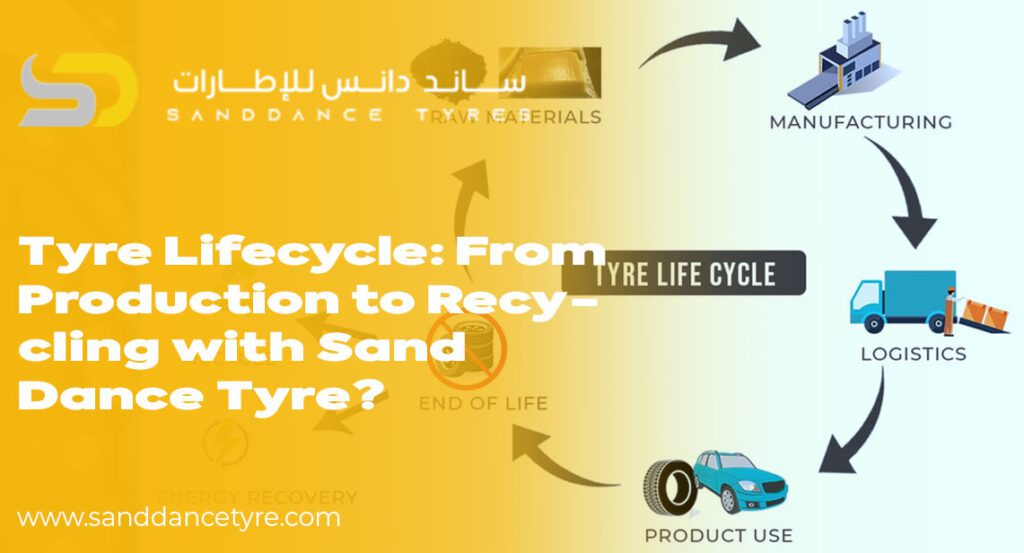
Every time out on the road, your car’s tires are putting up with heat, pressure, and road friction as they also support your safety and performance. But have you ever thought about what goes into a tire’s development before it hits the road and what happens to it after? At Sand Dance Tyre, we are of the mind that drivers who take part in the full tyre lifecycle do better at valuing in to play sustainable, safe, and responsible disposal practices in the UAE’s dynamic automotive scene. Read More: Budget Tyres Desert – Can They Handle Dubai’s Extreme Trips? Tyre Lifecycle: From Raw Material to Road-Ready Product The tyre lifecycle begins way before you put them on your vehicle. We start with the acquisition of raw materials tyres, which mainly are rubber, both natural and synthetic. Natural rubber is obtained from rubber trees, and synthetic from petroleum, which we process via chemical compounds to add strength and elasticity. Also, we mix in carbon black, steel, textile fabrics, and chemical additives, which we do to give tires the wear resistance they need for the extreme temperatures and varied terrain we have in the UAE. Once materials are put together, the manufacturing process goes into forming what will become the tread, side walls, and inner linings, which are the elements that make up the tyre. They are put together and then placed in a mold, which is subject to high heat, thus shaping the tire’s structure and putting in the tread pattern. After going through in-depth quality control and safety inspection, the tire is put out for distribution and sale. At Sand Dance Tyre, we have a large selection of tires that have gone through those in-depth processes, which also see to it that every unit meets international safety and durability standards. Life on the Road and Performance Wear Once a tyre is fitted to a vehicle, it goes into what we term its active life, which is for the most part between 40,000 to 80,000 kilometers, which varies by tyre type, driving habits, and road conditions. In the UAE, we see that tires put into service experience progressive wear of the tread, sidewall stress, and heat aging. In some cases, the tyre lifecycle in the UAE may be reduced if proper maintenance via inflation, wheel alignment, and rotation is not practiced. As tires reach the last third of their tread life, they begin to see performance issues. Braking distances lengthen, fuel efficiency goes down, and wet traction performance suffers. This is a critical part of the tire’s life cycle. It is in this stage that many accidents happen due to worn-out tires, which should have been replaced. At Sand Dance Tyre, we provide tread depth inspections, which will help you determine when it is time for a replacement. We at Sand Dance Tyre put your safety and performance first. Tyre End-of-Life and Environmental Impact When a tyre outlives its usefulness, it reaches what is at present called the end of life. Also, we see that many worn-out tyres end up in landfills or open storage, which in turn causes great environmental damage. Tyres are non-biodegradable, and when left unmanaged, they may trap rainwater, cause fire hazards, and, over time, emit harmful chemicals. However, we see in rubber recycling a great sustainable solution for waste reduction and promotion of circularity in the tyre industry. At Sand Dance Tyre, we are behind initiatives that take end-of-life tires and turn them into rubberized asphalt, playground surfaces, athletic tracks, and also into construction materials. Also, we are conserving raw materials and, at the same time, we are lessening the environmental impact of tire disposal. In the rubber recycling process, tires are ground out into chips or crumb rubber, which is put to new uses. Also, some tires are retreaded, which gives them a second go if the casing is still in good condition. That step in the tire cycle is at times ignored, but is very much a key element in the reduction of the carbon footprint of today’s transport. Driving Change: Sand Dance Tyre’s Commitment to a Responsible Tyre Lifecycle At Sand Dance Tyre, we do more than sell tyres; we are in the business of responsible tyre ownership. We assist you in the choice of high-quality tyres which are built from the best raw materials, and we also educate you on proper tyre care and disposal. Our team is on top of the UAE’s regulations, which include tire age, tread depth, and disposal, which we in turn pass on to you, so your vehicle is not only performing at its best but also operating within environmental guidelines. We also work with recycling organizations that offer tire return programs, which, for our customers, is a convenient solution for getting rid of old tires. Through our support of tyres at end-of-life initiatives and green practices, we aim to be at the front of the pack in terms of responsible mobility. Understanding the full spectrum of your tyre lifecycle will have you making better, safer, and more sustainable decisions. At Sand Dance Tyre, we are your guide through each stage from the showroom to the recycler — we smooth your ride and reduce your impact. FAQs 1. What is the tire wear-out rate in the UAE? Usually between 40,000 to 80,000 km, which may vary with driving conditions and maintenance. 2. When do I know my tyre is at the end of its life? Look out for worn tread, cracks, vibration while driving, or if the tire is over 5 years old. 3. Can tires be recycled in the UAE? Sure. Many recycling companies use tires as a resource for making rubber material for roads, playgrounds, and industry. 4. What’s the importance of tyre disposal to the environment? Improper disposal causes pollution, fire hazards, and mosquito breeding. Recycling, in turn, decreases these risks and also promotes sustainability.
Budget Tyres Desert – Can They Handle Dubai’s Extreme Trips?
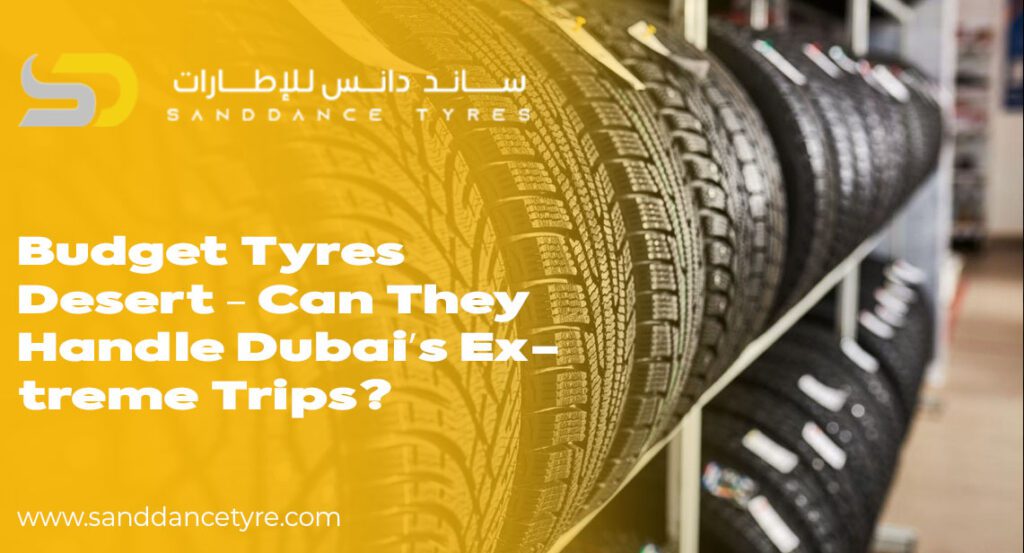
In a metropolis like Dubai, which is a mix of luxury and extreme natural settings, we see that planning a desert trip comes into plays a very large role in what vehicles you bring. Also very much up for debate among local drivers and off-road adventurers is the issue of do budget tires live up to the performance that the rough terrain requires of them. The rolling dunes, the extreme heat, and the unpredictable paths of Dubai’s deserts require tires that have great wear resistance, grip, and that also perform well in high heat. But does that mean that budget tyres desert trips are right out? Read More: Budget Tyres Desert – Can They Handle Dubai’s Extreme Trips? Hot Road Budget Tyres Desert Reliability in Dubai’s Heat Changing Perceptions of Budget Tyres When it comes to desert driving, what people picture is 4x4s that have rough all-terrain tires. These tires are made to handle sand that shifts, heat that builds up, and stress that the terrain puts on them. While premium tires do that job almost too well, we are seeing the budget tyres desert the market as they grow in quality. What we used to think of as budget, which is not known for great performance, well, those brands are improving their engineering to put out tires that do well at high temperatures and also do a good job of getting traction in soft sand. Where Budget Tyres Still Fall Short However, we see that which performance differences still exist. In desert-like settings, the performance results of budget tyres desert report that indeed they do well enough on hard-packed surfaces and light off-road, but in deep sand, their performance tends to drop off. Also, the rubber used in budget models may not have the same heat resistance as in the better quality tires. This is very much the case in Dubai, which sees temperatures over 45°C and road surfaces that may get even hotter. City Heat vs Desert Heat – A Tough Environment In summer, driving in the city or on Dubai’s highways puts great stress on tires. The asphalt gets very hot, and tires have to maintain their structure at the same time, performing well in terms of control and comfort. That is the role of what we term hot road budget tyres. Some of the more recent budget models feature silica in the compound and improved tread designs, which in turn better dissipate heat and reduce rolling resistance. Heat Resistance and Tyre Composition Still, not all budget tyres desert are indeed tested for UAE-like conditions. Tyres imported from cooler climate areas may perform below par when put in hot weather. We see that sidewall cracking, tread separation, and uneven wear are more common in such cases. At the same time, some budget tyre brands do put out products that have done desert testing and do very well under moderate use, also when vehicles are maintained properly and tyre pressure is adjusted for off-road use. Trip Durability and the Lifespan of Budget Tyres Desert Conditions How Long Will Budget Tyres Last in the Desert? Durable tires are what you need for desert travel. From a short off-road trip to a drive that takes you from Dubai to Liwa, tire wear out fast. Many drivers question which budget tires will last the distance on multiple desert trips and which ones may fail on us. Maintenance Makes a Difference While premium tires may give you 40,000 to 60,000 km of reliable service, budget tires usually do not last as long. But should you maintain them properly, that is to say, keep them at the right pressure, get them balanced and aligned regularly, and rotate them at the first sign of wear, some budget tires will put in acceptable service for desert use. The main thing is to choose budget models that are labelled for all-terrain or off-road use. Also, see to it that the tire still has good tread depth and is not close to its expiration date, as old tires are more prone to failure in hot weather. Our Expert View on Sand Dance Tyre At Sand Dance Tyre, we take a case-by-case approach. Not all budget tyres are created equal, but we have had some models do well in our performance tests and on the field. We put our customers’ driving habits, what terrain they expect to be driving in, and safety at the forefront of our advice. While we do recommend premium tyres for the frequent desert driver, we also see value in well-chosen budget tyres desert which may suit lighter to moderate adventure without a trade-off on safety or performance. Frequently Asked Questions (FAQs) 1. Are economy tires safe for desert driving in Dubai? Some economy tires do well for short desert trips, but they have to rate well in heat and off-road performance. 2. What is the issue with budget tires in hot weather? Risks of using such tires include reduced performance in heat, faster wear out, and blowouts if the tire isn’t designed for hot weather conditions. 3. How to increase the wear of budget tyres desert? Regular upkeep, proper inflation, and selection of tires that have been tested for desert use will greatly improve durability. 4. What is the performance of budget tires in off-road conditions and dunes? Only some all-terrain budget tyres will do for dunes. For the city, budget tyres do not do well in intense four-wheel driving.
How Tyre Supply Chain UAE Affects Availability
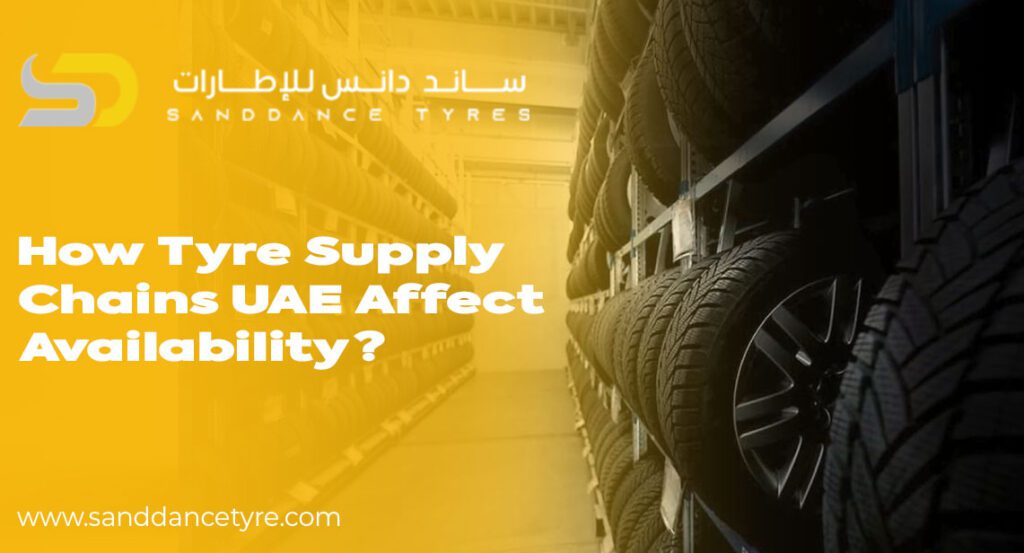
In our present connected world, tires do not simply leave the factory and go onto vehicles; they are a part of a very complex global manufacturing, shipping, and distribution network. In the UAE, the tire supply chain is no exception, and recent international events have brought to light how very vulnerable this chain is. We see in raw material shortages to port delays that any disruption may greatly affect tire availability, price, and customer satisfaction in the UAE. Understanding the dynamics of the tyre supply chain UAE is key for vehicle owners, fleet operators, and tyre retailers to better prepare for changes in product availability and pricing. The Global Tyre Supply Chain UAE: A Quick Breakdown The tyre industry uses a supply chain which includes: At any point in that chain, we see disruption, which in turn causes a ripple effect in the tyre supply chain UAE, which in turn sees inconsistent availability and price increases. Read More: The Science Behind Tyre Rubber Composition: From Raw Material to Road Major Factors Disrupting the Tyre Supply Chain UAE Let us look at what has been affecting the tyre supply chain UAE over the past few years. 1. Global Shipping Crisis Pandemics, port congestion, and geopolitical issues have caused shipment delays. We see that when container supply goes down or sea freight rates go up, tyre importers in the UAE bear higher costs or they have to wait longer. 2. Raw Material Shortages In large use of rubber and petroleum-based products, which is what we see in terms of production fluctuations (for instance of floods in Southeast Asia), play out in the tire manufacturing. This issue of supply then plays in for the UAE tire supply chain, which in turn sees stock issues. 3. Currency Fluctuations and Tariffs Currency exchange rate issues in manufacturing countries or growth in export tariffs have affected the price at the point of purchase of tires, which in turn we see passed on to consumers in the UAE. 4. Demand Surges and Panic Buying Whenever news breaks of delays or price increases, we see consumers and businesses panic-buy tires, which in turn depletes existing stock and puts more strain on the already stressed tire supply chain in the UAE. How This Affects You as a Vehicle Owner If, as a vehicle owner in the UAE, you are affected by: Understanding these factors will help you to plan, which is the case when you are replacing all four tires or getting your fleet ready for the change of seasons. What UAE Distributors and Retailers Are Doing Tyre retailers and distributors in the UAE are going in a different direction. These strategies are putting the rubber to the road in the UAE at a time of global uncertainty. Conclusion The tyre industry in the UAE does not escape global issues. We see raw material shortages, delayed shipments, and political issues affecting every step of the supply from the factory to your garage. By the time it affects your favorite tyre brand’s availability and price, which, by the way, is true for daily commuters, commercial vehicle owners, and automotive businesses. We are at the forefront of this at Sand Dance Tyre as we work with sure-fire suppliers and we watch global trends, which in turn we pass on to you so you have the best info for what is happening in the ever-changing tyre world. Plan, book early, and turn to the experts to help you through the changes in the tyre market. FAQs Why are there tyre shortages in the UAE? In the UAE, we see that at times there are tyre shortages, which are a result of global shipping delays, raw material shortages, and also due to geopolitical issues that play a role in manufacturing and logistics. Tyre prices going up in the UAE? Due to the issues in the tire supply chain, which are a result of increased freight rates, raw material costs, and currency fluctuations, we are seeing tire price increases across all brands and categories. What is the best way to prevent tire issues that present in high-demand seasons? To prevent supply issues, get your tyres before the summer and winter months, which see the most demand. Also, at that time, go for what we have in your area, which we can reliably supply. Which tire brands weather the global disruptions best? Brands that have manufacturing units in the Middle East or strong local distribution networks are less likely to face severe tyre supply chain UAE. Is it safe to purchase tires online in the UAE during supply chain disruptions? Sure, however, check that the seller is reliable and is updating stock info, which is an issue in the UAE at the moment. Also see return policies in case of out-of-stock products.
The Science Behind Tyre Rubber Composition: From Raw Material to Road
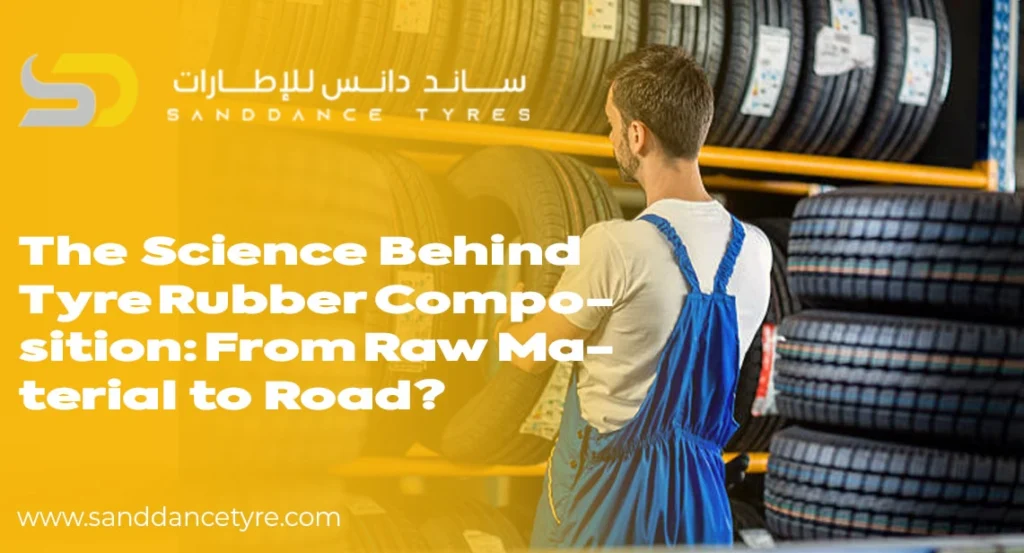
When it comes to tires, you may think of their grip, wear over time, or performance on the road. What you may not know is that what defines a tire’s behavior is very scientific: the tyre rubber composition. At Sand Dance Tyre, we are of the mind that to truly appreciate the performance, safety, and durability of your tires, it is important to understand what is in the rubber. The process from raw rubber to a finished tire is a study in chemistry, engineering, and innovation. Let’s look at the science that turns natural materials into high-performance road partners. Read More: How to Pay Traffic Dubai Police Fines Online in UAE: Step-by-Step Guide Understanding Tyre Rubber Composition Tyre rubber composition is a complex mix of many materials that we put together for optimal performance in extreme situations. What we think of as tyre rubber is a mix of natural vs synthetic rubber, carbon black, silica, oils, sulfur, and chemical accelerators. We tailor this mix to the tyre’s function for high speed, for rough terrain, or for a smooth long distance ride. Each tire’s makeup plays a role in its total function. For example, natural rubber is used for flexibility and tensile strength, which is also increased by the use of synthetic rubber, which we include for improved wear and temperature performance. Also, we have fillers like carbon black and silica, which will enhance durability, grip, and rolling resistance, which in turn are very key elements in tire compound science. Natural vs Synthetic Rubber: The Key Differences In the discussion between natural vs synthetic rubber, which plays out in tyre manufacturing. Natural rubber, which comes from the latex of rubber trees, is known for its great flexibility and strength. It also has better tear resistance and is particularly valuable in truck and heavy-duty tyres, which require high load-bearing capabilities. Synthetic rubber is a product of petroleum, and we produce it to have certain features like heat resistance, wear resistance, and consistent performance in many environmental settings. Tyres usually use a mix of both; we put in what each type does best. In Pakistan and the UAE, which have very different temperature ranges and road conditions, the right mix of natural vs synthetic rubber is what we use to make tires that do well in hot asphalt and rough terrain. The Role of Tyre Compound Science Tyre compound science is that which deals with the formulation of rubber compounds for which a tyre is to perform as intended. In different sections of the tyre, for instance, the tread, the sidewall, and the inner liner, we see different performance requirements which are met by varying compound types. Tread compound is for grip and wear resistance; at the same time, sidewall compound is for flexibility and impact absorption. In terms of modern-day tire compound science, we have seen the introduction of materials like silica, which in turn reduces rolling resistance and improves fuel efficiency, which is a very important issue for eco-conscious drivers. The Curing Process: Finalizing the Tyre’s Properties Once the rubber compound is mixed, we see what is called the vulcanization or curing process. In this, the rubber is heated with sulfur, which in turn forms cross-links between polymer chains. This chemical reaction changes the once sticky and pliable rubber into a tough elastic material, which can also return to its original shape when stressed. The key to a tyre’s final performance is in the curing process. It is out of this process comes the tyre’s strength, flexibility, as well as how it handles heat build-up, deformation, and wear over time. A tyre that is cured just right will perform better on the road, handle corners better, and will also be a safer option. At Sand Dance Tyre, we are focused on tires that have gone through exact and high-quality curing. We see to it that every tire we put out meets international standards for safety, performance, and durability. Why Tyre Rubber Composition Matters for You For most people, the issue of what goes into tyre rubber may not be at the front of their mind, but it does play a large role in how they drive each day. What may not be known is that from performance on winding roads to that extra grip during rainy weather, the rubber inside of your vehicle’s tires is a big player. In some areas, like the UAE, that see very hot climates, which in turn cause quick wear out of low-quality tires, the role of the right rubber compound is of even more importance. At Sand Dance Tyre, we provide our customers with the choice of tires that best fit their environment, in which they drive, and which also meet safety standards. We at Sand Dance Tyre study the science of rubber to present to you not just any tire, but performance, safety, and peace of mind in every trip you take. FAQs What do we see as the distinction between natural vs synthetic rubber in tires? Natural rubber is flexible and strong, but synthetic rubber is designed for heat and wear resistance. Tyres usually put together a mix of both for the best performance. Why is tyre rubber composition important? The makeup of a tire determines its grip, durability, and heat resistance, which in turn affects performance. What do we mean by the term curing in tire manufacturing? Curing, also known as vulcanization, is a heating process that hardens rubber, thus giving tyres their strength and elasticity as well as their definite shape. What role does tyre compound science play in performance? Manufacturers are able to design various components of the tyre for particular functions, which in turn produce a complete and high-performance product.
How to Pay Traffic Dubai Police Fines Online in UAE: Step-by-Step Guide
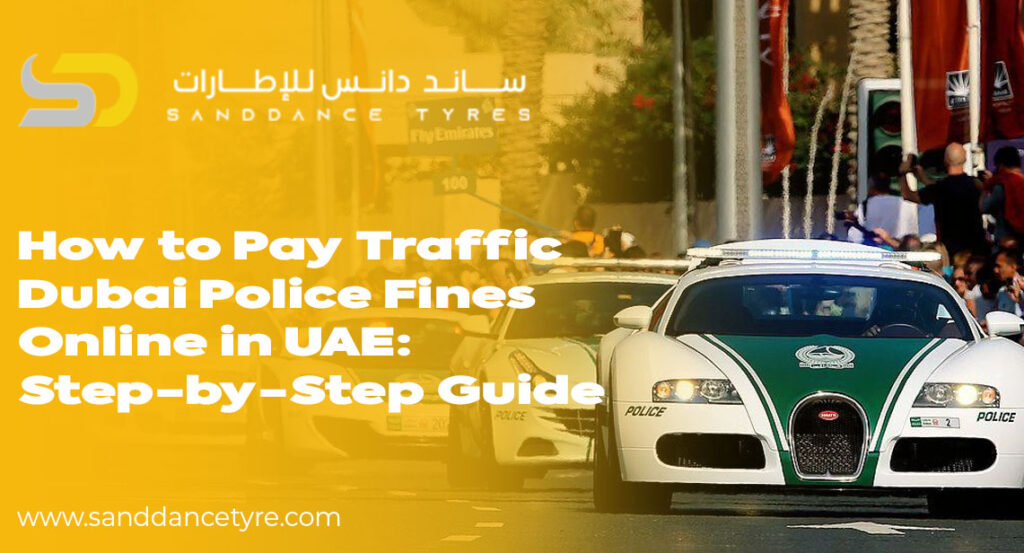
Dealing with RTA in Dubai can be a stressful experience, which is true for both residents and visitors alike when they are unsure of how to proceed. However, the good news is that the UAE government has implemented measures that make it easier today to pay and check Dubai police fines online. As a resident or visitor, you can check on your fined vehicle in Dubai, view the penalties, and pay the fine via your phone or computer. In this guide, we will walk you through each step of the process, helping you avoid penalties and delays. Read More: Salik Balance Check & Recharge Online: Complete 2025 Guide How to Check and Pay Dubai Police Fines Online In Dubai, the primary method of dealing with Dubai police fines is through the RTA portal. The RTA fines Dubai check system also provides in-depth information on the penalties you have, allowing you to pay them immediately. Step 1: Visit the Official RTA Website Go to the RTA leading site. From the home page, go to the “Driver and Car Owner Services” section. Step 2: Select “Traffic Fines Payment” Click on the “Fees Payment” tab. Here you will see options to enter: This process enables RTA to fine Dubai checks immediately. Step 3: Review and Confirm Fine Details The portal will show: It is a sure way to obtain an acceptable record in Dubai. Step 4: Proceed to Payment Upon confirming the details, proceed to pay. Upon completing your payment, you will receive a digital receipt. Check Dubai Police Fines Easily Using Their Digital Services If you receive a fine from the Dubai Police, visit their website or mobile app for information on acceptable payment options for traffic fines. Step 1: Access the Dubai Police Website or App Visit us at dubaipolice.gov.ae or download the Dubai Police app from the Google Play Store or App Store. Step 2: Choose “Fines Inquiry and Payment” From the services, select the “Dubai police fines inquiry” option. You can search by: This tool allows you to look up Dubai fines in seconds. Step 3: View Your Violations Details shown include: This is especially true for those who have multiple parking tickets in Dubai. Step 4: Make the Payment Select your payment option and proceed with the transaction. You will get a confirmation on screen and via email or text. Other Platforms to Check and Pay Dubai Police Fines You are not tied to RTA or Dubai Police. In the UAE, we have many options. 1. Ministry of Interior (MOI) Website This platform applies if the fine was issued outside of Dubai. 2. Smart Kiosks Across Dubai Self-service kiosks enable you to: These are found in malls and at RTA centers. 3. DubaiNow App In the DubaiNow app, you have access to over 130 government services, which include Dubai traffic fines check. Just download the app and head over to the “Driving” section to see your fines. Discounts on Traffic Fines Dubai Great news: In many instances, the UAE reports traffic fine discounts, which we see as an incentive for early or full payment. Types of Discounts: Early Payment: Up to 50% off if paid within 60 days. Dubai Police Offers: On the occasion of the UAE National Day. Points Reduction: In some cases, you may be eligible to take a driving course to reduce black points. How to Check Eligibility Use the Dubai Police app or RTA sites to check if your fines are eligible for a discount before you pay. Common Traffic Violation Dubai Knowing the main traffic violation Dubai will help you avoid fines in the future. Violation Fine (AED) Black Points Speeding over limit 600–3,000 Up to 23 Running a red light 1,000 12 Parking in disabled area 1,000 6 Using a phone while driving 800 4 No seatbelt 400 4 Also, note that repeat offenses will result in vehicle impoundment and also greater car fines in Dubai. How to Avoid Future Dubai Traffic Fines To remain in compliance and avoid fines from the Dubai police. Also, download the Dubai Police app and RTA app for real-time alerts. Benefits of Paying Traffic Fines Online in the UAE Still unsure about making the switch to online payment? Here’s why you should: Final Thoughts Paying Dubai police fines is no longer a chore that includes standing in long lines or filling out paperwork. We offer digital solutions that allow you to check your traffic violations in Dubai, identify what you are at fault for, and pay off your ticket in just a few simple clicks. As a resident of Dubai for a while or a new expat, the key to safe and lawful driving is to stay informed and proactive. Avoid hefty fines by getting in the habit of checking your car fines in Dubai. Download the Dubai Police app and utilize online resources to quickly and easily manage all your vehicle-related requirements. FAQs Q1. May I pay fines for another’s car? Of course, as long as we have the necessary info and consent. Q2. What is the due date for payment of Dubai police fines? Sure. Within 60 days, most fines must be paid to avoid additional penalties. Q3. What happens when I ignore my traffic fine? Unpaid fines can lead to: Q4. Do I get an early payment discount? Yes, in many cases, Dubai traffic fines can be paid early via the Dubai Police app or RTA portal. Q5. Do you see black points for each traffic ticket? Not all fines come with black points. See the detailed violation list at the Dubai police fines portal. Q6. Is it possible to pay traffic fines in installments? In some cases, banks in the UAE will report that they are providing 0% interest on payment plans for your fines if you pay with a credit card. Q7. Which is more accurate: RTA or the Dubai Police site? Both are accurate; go over them to see if the fine is listed under various jurisdictions.
Fake Tyre Detection: How to Spot Counterfeit Tyres in the UAE
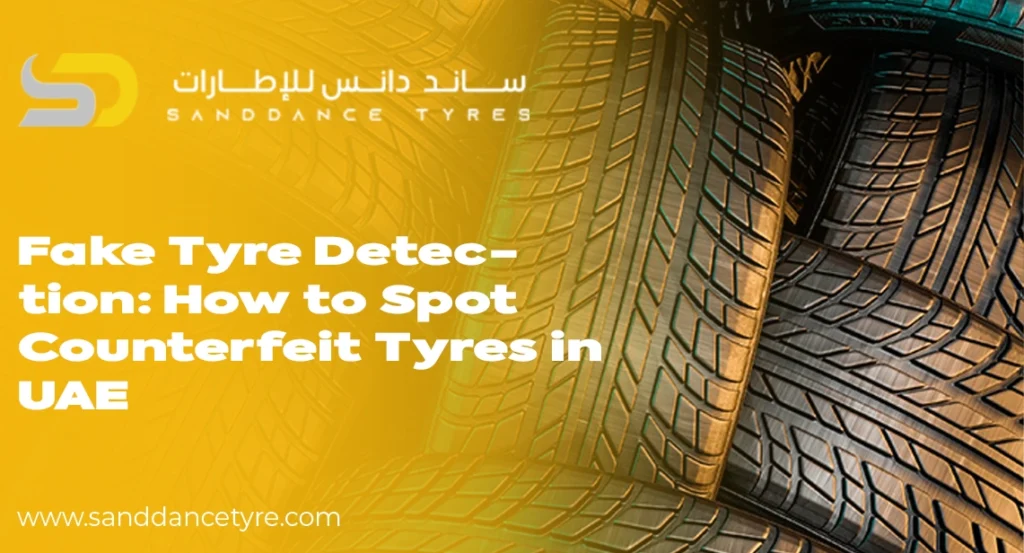
In the UAE, which has very hot weather and rough terrain as well as high-speed driving on the highways, quality tires are a must. That’s why we see the value in fake tyre detection for every car owner. Counterfeit tires may look the part, but in fact, they fail when it counts. Also, being able to find out which ones are the fake tires will save you and your car from a very expensive repair bill and possibly even save lives. Why Fake Tyres Detection is Important in the UAE? In the growing market for counterfeit goods, tires are also a part of the issue. Fake tires, which may replicate the name and look of the real thing, do so in a non-engineered way, without the safety certificates and in terms of heat resistance. In a country like the UAE, which sees temperatures peak at over 45°C, this is a very serious issue, that’s why fake tyre detection is important. Here is what we see for the most part in terms of why fake tyre detection is so important:. In the issue of road safety, a great concern in the UAE which it is, government agencies have gone after illegal tyre imports. Also, many fake tyres get in , especially at second hand or from unauthorized sellers. Read More: How Tyre Ply Rating Load Affects Capacity Key Signs for Fake Tyre Detection in the UAE Learning which is the basic inspection to do will help you avoid fake products. Here’s what to look for:. 1. Misspelled Brand Names or Logos Check out the tire side wall. Typos such as “Michelan” instead of “Michelin” or logo variations are very large issues. 2. No DOT Code or E-Mark Genuine tires will have DOT codes or E markings, which are proof that they meet international standards. If these are absent or look to have been tampered with, they are likely fake. 3. Wrong or Missing Manufacturing Date Check the date code, which is in a four-digit format (ex., 1323 stands for the 13th week of 2023). If the code is absent or doesn’t make sense, it is an indicator of a fake product. 4. Inferior Tread Pattern Compare your tire tread to that which is listed on the manufacturer’s site. Many counterfeit tires have uneven or abnormally low wear patterns. 5. Suspicious Price Deals If it sounds too good to be true, it is. Very cheap tires are usually counterfeit or past their date. 6. No Invoice or Warranty Card Legitimate tire dealers will always issue a certified receipt and warranty. Should a seller not do that, go away. Where to Buy Authentic Tyres in the UAE To avoid counterfeits at all buy from trusted sources. Certified dealers, authorized service centers and official sites are what you should use. Also, many of today’s platforms provide verification services for tyre serial numbers. Professional help for fake tyre detection is also easy. Trained mechanics notice details that may pass you by. Conclusion: Stay Safe with Smart Tyre Shopping Counterfeit tires present a silent threat that many in the UAE ignore until they have a breakdown. We put in the work to learn how to tell the fake tires from the real deal, which in turn will see you and your car through more miles. Watch for telltale signs like off-brand labeling, missing lot numbers, and prices that are too good to be true. Also, stick to the certified sellers. With information on your side, you can protect your purchase and feel secure behind the wheel. Read More: How to Measure Remaining Tyre Tread Depth Check Easily FAQs What can I do to verify that my tires are original and not fake? Use the DOT code, check out the manufacturer’s logo, and look at the tread pattern. Also, you may cross-reference the serial number with the brand’s official site. Do fake tires pass inspection in the UAE? Usually, it is not the case. RTA requires that tires meet safety standards. Fake tires may fail to do so because of a lack of certification or date code. Where do I report fake tires in the UAE? You can report to the UAE’s Ministry of Economy or local consumer protection entities, which we also do routine checks and issue fines. Is it safe to purchase used tires in the UAE? At the very least, use a known good dealer that offers a warranty. Also, do a fake tyre detection check before buying used tires.
Salik Balance Check & Recharge Online: Complete 2025 Guide
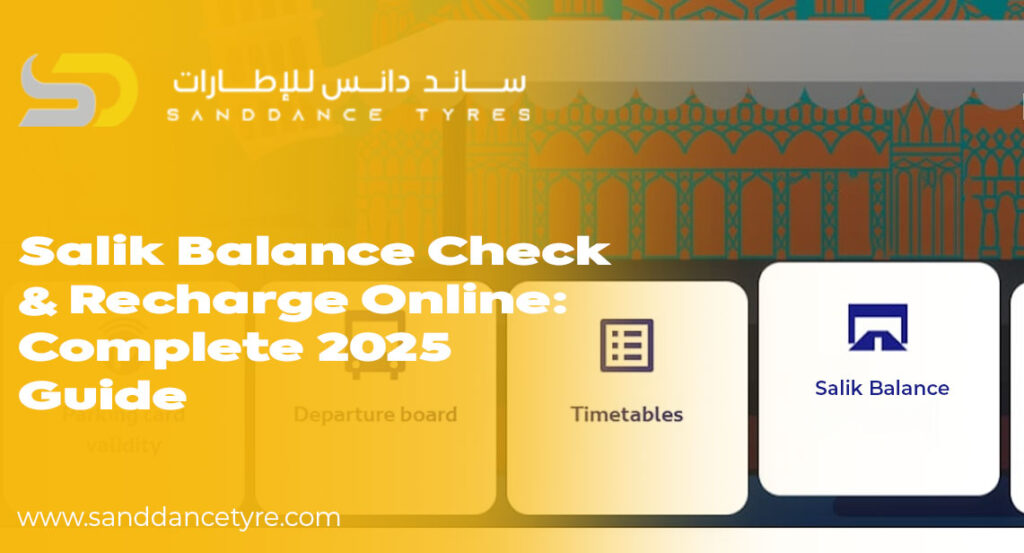
What is Salik in the UAE? Salik is Dubai’s electronic road toll, which is run by the Roads and Transport Authority (RTA). We have RFID tags that you put in your car’s windscreen. As you pass through a Salik gate, the system takes the toll out of your Salik account. To prevent large fines and for a stress-free experience at the toll gates, it is important to check your Salik balance and do a timely Salik recharge online. A Salik account also gives you control of your toll expenses, which have flexible top-up options. How to do a Salik Balance Check in Dubai In 2025, there are several methods for the Salik balance inquiry and check. 1. Salik Website (www.salik.ae) Check out your Salik account balance by visiting the Salik official website with these steps. 2. Salik App (Smart Salik) The Smart Salik app is easy to use for balance check, management, and recharging. You can easily check your Salik balance through these steps. 3. By Plate Number Plate number is also one of the sophisticated options to check your Salik balance. Do follow these steps: 4. By SMS or Call You can also check your Salik balance through Salik SMS or Call services. 5. Through RTA Services The RTA website or app also allows you to check your Salik balance. How to Recharge Salik Account Online If you have a low Salik balance, you can do a Salik recharge online, which goes as follows:. 1. Recharge via Salik Website Reload your Salik credit card through the Salik website: 2. Recharge via Smart Salik App Follow these easy steps to recharge your Salik account through the Smart Salik App. 3. Recharge Salik via Retail Cards Easily log in to your Salik account and quickly recharge your account through retail cards. 4. Salik Recharge Without Account Number Not remembering the account number? Use tag or plate number for Salik recharge. 5. Recharge via Bank or Exchange Apps Use bank or exchange apps to top up the Salik account balance. Salik Registration and Activation To get started with Salik, you need to activate your tag. Buying Salik Tag Online If you are a first-time Salik user or have just gotten a car in the UAE, we recommend you buy Salik online at the official Salik site or from licensed sellers. Also, you can get a Salik tag online from whichever fuel station or supermarket is a part of the program. Do register your tag with your Salik account once you purchase it. Understanding Salik Charges and Penalties Each time your car goes through a Salik toll gate, a standard Salik charge of AED 4 is deducted from your balance. Here are some things you need to know: Through the use of your Salik login or app, you can avoid extra charges. Common Salik Services and Terms Term Meaning Salik number Your unique account or tag number Salik account Profile that holds your balance and vehicle info Dubai Salik recharge Adding funds to your Salik account Salik charges AED 4 per gate pass Salik online payment Paying via website, app, or bank Buy Salik tag online Available at www.salik.ae or retailers Salik RTA The authority that governs Salik toll systems Benefits of Managing a Salik Account Online Managing your Salik account online, which in turn will prevent penalties and improve your convenience. Having a current Salik balance at all times gives peace of mind while passing toll gates and also saves time. Read More: Wheel Width Tyres: What’s the Impact on Performance and Safety? Final Words Maintaining your Salik balance is key to smooth driving in Dubai. With features like Salik login, Salik recharge online, and Salik balance check, we have made it easy for you to handle your toll payments from anywhere. Whether you’re into the Salik top up online, the recharge cards, or the Salik Smart App, we have made the process quick and stress-free. At Sand Dance Tyre, we are not just into your tires, we are into your total driving experience. That’s what we do, which is to keep you in the loop with useful and related guides like this. Also, watch out for more of our tips on driving in the UAE, or drop by for premium tires, wheel alignment, and auto services. Frequently Asked Questions Q1: What is the Salik recharge number for SMS? Use Salik’s official line 800-72545 or send a text message if your mobile is tied to your Salik account. Q2: Can I reload my Salik balance without logging in? Yes, you may use Salik quick pay or tag in at the time of recharge on the Salik portal. Q3: What is the rate of Salik at each toll gate? AED 4 per passage. Also, some gates are capped daily. Q4: How do I sign up for a new Salik tag? Buy a tag on a website or at a local petrol station and activate it at Salik’s site. Q5: Is Salik related to RTA? Yes, Salik RTA is the entity that runs the toll infrastructure. Your Salik account is a part of your RTA profile. Q6: May I recharge my Salik? Yes. Many in the UAE can top up their Salik accounts through mobile banking. Q7: What if I run out of Salik balance? For each toll gate passage with insufficient balance, you will pay AED 50. Q8: How do I verify my Salik balance check number? Use your registered account info to verify and check via the official app or site. Q9: What if I get out of my Salik login PIN? Use of the “Forgot PIN” feature on the Salik site or call us at customer care. Q10: Can I pay for my Salik balance in cash or with top-up points? Yes, also at authorized resellers and online via Salik recharge cards. Q11: May I have more than one vehicle in my Salik account? Yes. Your Salik account may have many tags and vehicles.
How Tyre Ply Rating Load Affects Capacity
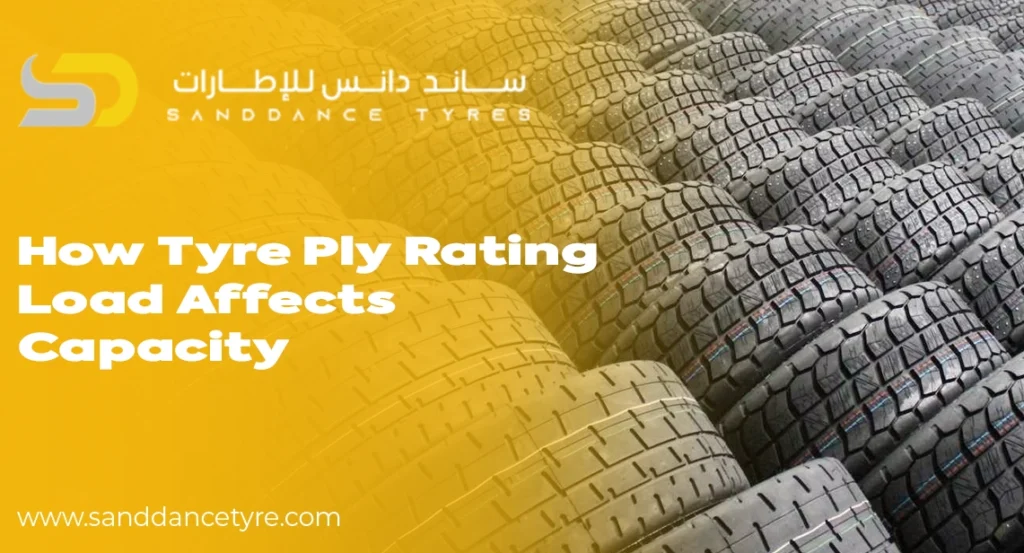
In the UAE, which is very harsh for vehicles, which includes extreme heat, heavy loads, and long-distance travel, the choice of tires you choose is out of the question, with about size and brand. What is very important and at the same time often left out is the tyre ply rating load. This rating plays a great role in how much weight your tire can safely bear and how well it does under stress. Whether you are in an SUV, pickup truck, or commercial vehicle, it is of great importance to know your tyre ply rating load for safety and performance. Read More: How Nitrogen Tyre Benefits High‑Mileage Drivers What Is Tyre Ply Rating Load and Why Does It Matter? In the past, tyre ply rating load was determined by the number of layers of rubber-coated fabric (plies) that went into a tyre’s construction. Today we see fewer plies used in modern tires, which is due to progress in material science; however, the rating is still a useful indicator of a tyre’s strength and load carrying ability. Here’s why ply rating matters: Tyres of a higher ply rating are best for commercial vehicles or SUVs, which see heavy loads often, but lower ply tires will do for the average passenger car. How to Choose the Right Ply Rating for Your Vehicle Selecting the proper tyre ply rating load for your vehicle is based on what you use your car for. Here is a guide to help you out. 1. Know Your Vehicle’s Requirements 2. Understand Ply Ratings: 3. Consider Driving Conditions in the UAE 4. Check for Manufacturer Labels Choosing a poor tyre ply rating load for your vehicle will result in faster wear, higher temperatures, and in some cases, tyre blowouts, which we often see on the long stretches of the UAE’s highways. Advantages of Higher Tyre Ply Rating Load Also in that which is of great importance is to find that middle ground. While higher ply tires do indeed have more strength, they also may see a stiffer ride and reduced fuel efficiency, which may not be necessary. Book Now: Tyre Balancing Service in Dubai, UAE Conclusion: Why Ply Rating Should Never Be Ignored In the UAE\’s climate for tire safety and performance, you don’t just pay this issue forward; tire ply rating is a critical present. It determines what load your vehicle can safely handle, the stability of your ride, and the life of your tires. Always refer to your manufacturer’s guide, think of your driving habits, and choose the right ply rating for your vehicle. For expert tire selection and professional fitment, see Sand Dance Tyre, your go-to tire partner in the UAE. FAQs What is the best tyre ply rating load for heavy-duty trucks in the UAE? In the UAE, for heavy-duty trucks, we see that 10 ply-rated tyres for commercial use or Load Range E tires are the best option, which is due to their strength and performance in high temperatures and weight. What role does tyre ply play in fuel efficiency? A greater tire ply rating for load support will see some reduction in fuel efficiency at the hand of increased rolling resistance. Also, it brings better durability and safety. Can I put low-ply rated tires on my vehicle for use in the UAE off-road? In the UAE off-road environments, it is not recommended to use low-ply tires. For better performance in off-road conditions, it is best to use higher ply-rated tires, which also will do a better job at resisting punctures and carrying heavier loads. How to read the ply rating of a tyre? Check out the sidewall of the tire. There you will see marks which may read “Load Range C” or “10 PR”, which note the ply rating for load capacity. Is a higher tire ply rating always better? Not always. While high ply rating tires for heavy-duty vehicles are a must, in the case of regular cars, they can reduce comfort and fuel efficiency. Match the tire to your car’s load requirements.


